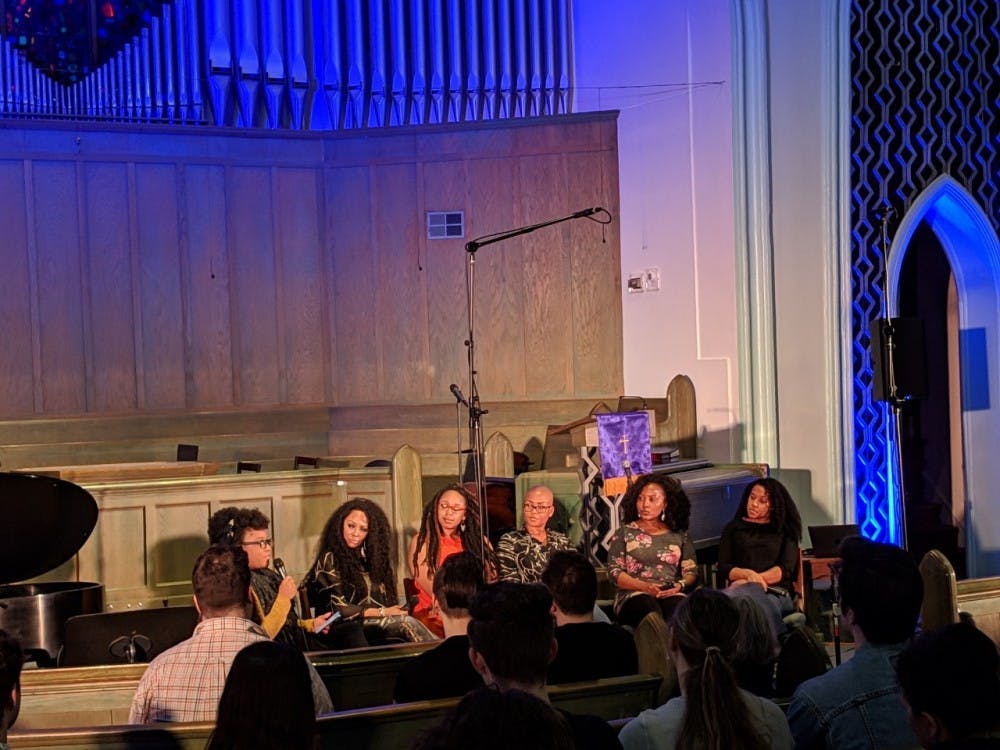Rise Bmore hosted a panel of women from A Revolutionary Summer, a summer reading and writing program for black teenage girls, on Friday. A Revolutionary Summer allows selected participants to study and write literature, seeking to present a more complete narrative about black women and girls in history than what many may learn at their high schools.
Rise Bmore is a free discussion and concert held in honor of Freddie Gray, a black man who died from injuries sustained while in police custody. The event takes place on the anniversary of Gray’s death, April 19.
The panel featured the five women who lead A Revolutionary Summer: Andrea Better, Nichelle Calhoun, Andria Nacina Cole, Shamoyia Gardiner and Nicole Karikari. The discussion was moderated by blogger and social activist Brittani McNeill.
Founder and Artistic Director of Rise Bmore, Judah Adashi, explained that the format of the event, which consists of a panel and a concert, was intended to honor Gray.
“Baltimore’s black artists and activists are the heart and soul of the city, the bearers of its beauty and its truth. My hope is that our format invites the audience into that beauty and truth. While the evening’s subject matter has broadened over the years, Freddie Gray remains the “why,” the reason that we gather in solidarity on this particular day each year,” he wrote in an email to The News-Letter. “My hope is that the audience comes away feeling in some way transformed by the experience.”
Cole, who is the director and co-founder of A Revolutionary Summer, explained why she found it important to focus on the education of black girls.
“This work has to be done. Our girls don’t have the images, stories, narratives to look to guide them,” Cole said. “Where they find those authentic images is literature and art.”
The program began in 2015 in response to the death of Freddie Gray.
According to Cole, while many people were focusing on black boys in the wake of Gray’s death, her program worked with black girls because that was her area of expertise and she had grown up in an all-female household.
“To be transparent and sincere, black boy love was foreign to me,” Cole said. “I had been raised in a house with all women. In my experience it has been black women who have been in my heart. When my heart’s been broken to pieces and the fragments are all at my feet, it’s black women who have gathered those pieces and given them back to me.”
The program’s participants are referred to as “daughters.” Gardiner explained that by referring to the girls as daughters, it establishes an instant connection between her and the participants.
“When we call our participants daughters, there’s a sense of loyalty to them, and responsibility for them,” she said.
Calhoun explained that, for her, the word daughter connects the girls to all the experiences that have come before.
“There’s a wholeness to it because having a daughter means survival, but there’s also something contemporary and present about the experience of being a daughter,” she said. “I see these daughters as a continuum of a great line of women and their experiences.”
Karikari spoke about how the program supports girls in deconstructing oppressive narratives about black women that are prevalent in media.
“It’s a moment to unlearn, to catch yourself in the moment and understand how you acted… and create a new story for yourself,” she said.
The program also focuses on teaching self-care techniques, such as mindfulness and yoga, Better explained.
“[Yoga] has so many healing modalities, emotionally, spiritually, physically,” Karikari said.
According to Calhoun, the school system helps prop up societal and cultural norms that erase black knowledge. She explained that knowledge that is important in black communities is not valued by our current education system.
“Our girls walk into spaces, they walk down streets that are named after people who never even recognized their humanity. [White supremacy] is embedded in every part of the system. And it is a system that completely invisibilized their knowledge,” Calhoun said.
A series of performances featuring Baltimore artists followed the panel discussion.
Nikia SanKofa is a Baltimore resident who attended the event. She explained that she found the discussion particularly impactful because she has a 15 year-old daughter, and girls must be at least 15 years of age to apply to the program.
“It’s also about restoration, self-dignity, self-respect and beginning to recognize and understand the institutional and internalized oppressions that you need to be mindful of,” she said.





